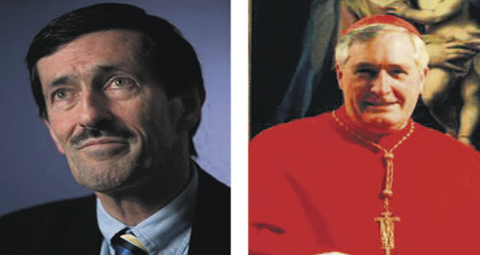BY Ian Dunn | February 28 | ![]() 0 COMMENTS
0 COMMENTS ![]() print
print

Independent or not, Scotland must recognise value of Catholic schools
Professor Anthony Finn’s Cardinal Winning lecture tomorrow will to raise the need for the country to promote religious diversity in its school system
If Scotland votes for independence it must continue to recognise the contribution Catholic schools make to Scottish life, according to the key note speaker at the 2014 Cardinal Winning Lecture tomorrow.
Professor Anthony Finn (above left), the former chief executive of General Teaching Council for Scotland, will give the 2014 Cardinal Winning Lecture at Glasgow University tomorrow morning. During the lecture, the professor, who recently carried out an extensive survey of Catholic education in Scotland, plans to express his hopes the country will continue to show maturity in promoting religious diversity in its school system.
“As Scotland prepares for a referendum in which it will decide whether it should become an independent state, mature enough to take its own decisions, our country must also be mature enough to accept that there is a continuing demand for denominational schools,” he is expected to say. “A Scottish Government report has recently stated that there is no evidence at all that the presence of denominational schools helps to promote sectarianism. Catholic schools are not narrow or inward looking; they provide positive service to very wide communities. They never did and never could support such an evil prejudice. “
Professor Finn, a former headteacher and senior officer in Fife and now based in Glasgow University, will analyse patterns of attendance and achievement in Catholic schools in his talk organised by the St Andrew’s Foundation.
His findings suggest that Catholic schools generally perform very well and are popular in the communities which they serve and that the current Catholic school population is certainly not limited to traditional Catholics, or even to those who no longer practice their religion. Other Christians and those of no religious background, are also opting for a values-based education for their children.
Although the number of Catholics attending church services has decreased in recent years, there seems to be no shortage of parents who wish to enroll their children in Catholic schools, a number of which are now oversubscribed.
Professor Finn is expected to also highlight issues during the lecture—established to honour the late Scottish cardinal it is named after (above right)—that he believes the Church and Catholic educators should review as its school population changes.
“I have suggested strongly that we should become more positive in talking about Catholic education, stressing its value and its values and putting behind us any residual recidivist defence of an outdated image of the Catholic school,” he will say. “Instead, we should be very proud of the progress which has been made and the standards which have been attained by Catholic schools, progress which has offered life chances to Catholics which by far outweigh the aspiration of those responsible for the 1918 Act; progress which is now attractive to those of many faiths and none. We should celebrate the fact that our schools generally offer admirable service to the communities which they serve, whether advantaged or disadvantaged, whether Catholic or of other faiths.”











